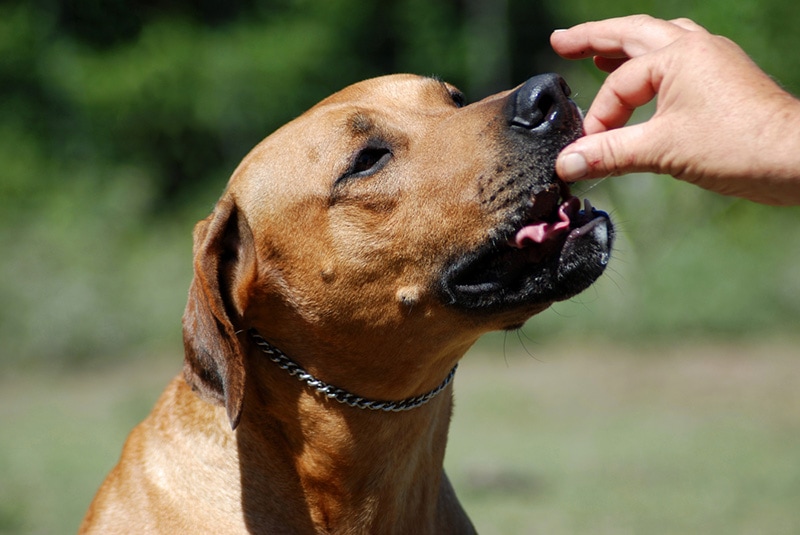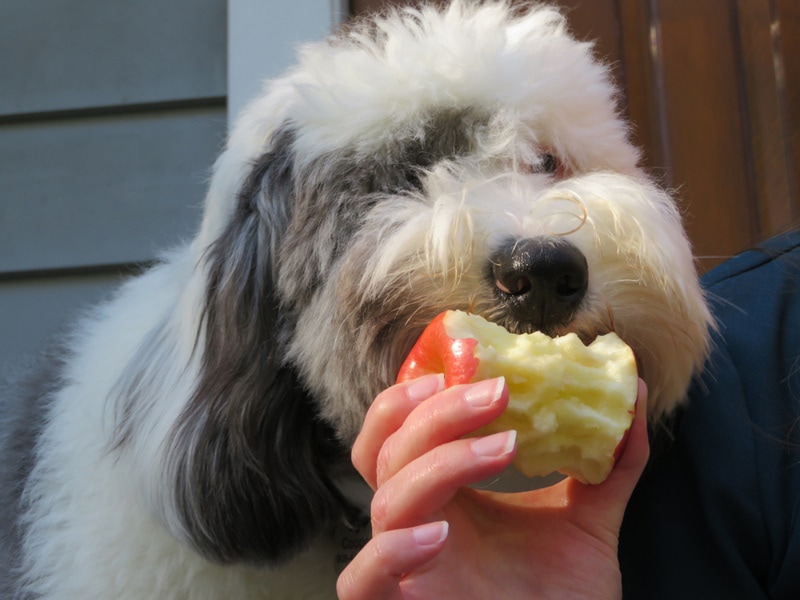
Click to Skip Ahead
Whether you enjoy them as a salted morning ritual to go with your coffee or as a zesty salad topper, grapefruit is a healthy fruit for humans that’s loaded with antioxidants and vitamin C. This may lead you to wonder if your dog can also benefit from eating grapefruit as a wholesome snack. Unfortunately, grapefruit is a highly acidic fruit that can upset your dog’s tummy. Furthermore, while the fruit itself isn’t poisonous, the skin and peel are actually toxic to dogs. You should avoid giving grapefruit to your canine and instead opt for some safer fruit snack options.
Why Dogs Can’t Eat Grapefruit
The essential oils and psoralens contained in a grapefruit’s skin and rinds are toxic to dogs. The fruit itself doesn’t have these properties, so it’s relatively safe. However, just because it isn’t poisonous doesn’t mean it’s a good idea to give it to your dog. The flesh is highly acidic and likely to irritate your dog’s stomach if ingested. If your dog only eats a small bite of the fruit, they aren’t likely to need medical attention since it isn’t toxic. You should definitely call your vet though if you suspect they’ve eaten a large amount, may have eaten any of the skin or other parts of the plant, or are showing signs of being unwell.
If you have reason to believe your dog has eaten the skin or peel—or anything toxic—call your vet immediately. A vet can often induce vomiting and catch the problem early before it has a chance to cause harm. Once your dog shows signs of illness, the toxins have likely been absorbed in their bloodstream. In that scenario, your dog may need to stay at the clinic for supportive care such as fluid therapy.

What If My Dog Likes Grapefruit?
Health risks aside, dogs aren’t likely to even enjoy the taste of grapefruit because of its highly acidic nature. However, some dogs acquire an unusual fondness for certain foods. If your dog is one of the few that find grapefruit appealing, be sure to securely dispose of the rind and skin once you’re finished with your snack.
Citrus fruits such as oranges and mandarins are a safe alternative to grapefruit that are similar in taste. Just be sure to remove the rind and seeds before giving a slice to your dog. While citrus isn’t toxic to dogs, you still don’t want to overdo it since it’s an acidic food that’s loaded with natural sugar. Also, if you have any feline friends in your house, keep in mind that all types of citrus fruits are toxic to them and should never be shared with your cat.
What Are Some Safe Snacks for Dogs?
Your dog’s bowl should already contain all the nutrition they need. A commercially manufactured dog food that meets the nutritional adequacy standards established by the American Association of Feed Control Officials (AAFCO)—and approved by your vet—is formulated to meet your dog’s dietary requirements. However, just like how we like to munch on snacks and may benefit from vitamin supplements, it can be a good idea to give your dog a little something extra to munch on, as long as they don’t have any underlying health conditions like diabetes that would make superfluous calories a bad idea. It’s also worth noting that dogs can manufacture their own vitamin C and do not need to get it from vitamin C rich foods and supplements like us humans do.

Though not an exhaustive list, these fruits and vegetables serve as food for thought:
Blueberries
Blueberries are an excellent snack for your dog. Considered a superfood by human and canine nutritionists alike, these cerulean fruits power your pup with antioxidants, fiber, vitamin C, and vitamin K. For these reasons, they’re a prominent ingredient in many commercially produced dog treats. You can also find them in bulk at your local grocery store if you prefer to give them to your dog whole or want to save money by making your own homemade dog treats.
Carrots
Carrots are a great source of fiber, antioxidants, and potassium. Some pet parents like to freeze raw carrots so that their dog can enjoy them as a crunchy popsicle.
Apples
Apples are another appetizing snack for your dog to munch on. However, be sure to completely remove the core and seeds first, as the seeds contain cyanide.

Bananas
Bananas can be served fresh in tiny slices, or blended and frozen into delicious doggie pops. These yellow fruits are frequently praised for being high in potassium, but they also serve up a beneficial supply of antioxidants and folate. As with most fruits, they’re high in natural sugar, so you shouldn’t give your dog more than a few bites of banana as a treat.
Conclusion
Unfortunately, grapefruits aren’t safe for dogs. The skins and peel are outright dangerous since they contain essential oils that are toxic to them. The flesh is technically not poisonous but can cause severe GI distress if ingested due to the acidity. If you’re looking to boost your dog’s levels of antioxidants and vitamins, shop for a safer fruit, such as blueberries or apples. Of course, it’s still okay if you like to eat grapefruit. As with other potentially poisonous foods, store them in a safe place away from your pets, and secure the remnants in the trash once you’re finished.
Featured Image Credit: margouillat photo, Shutterstock








